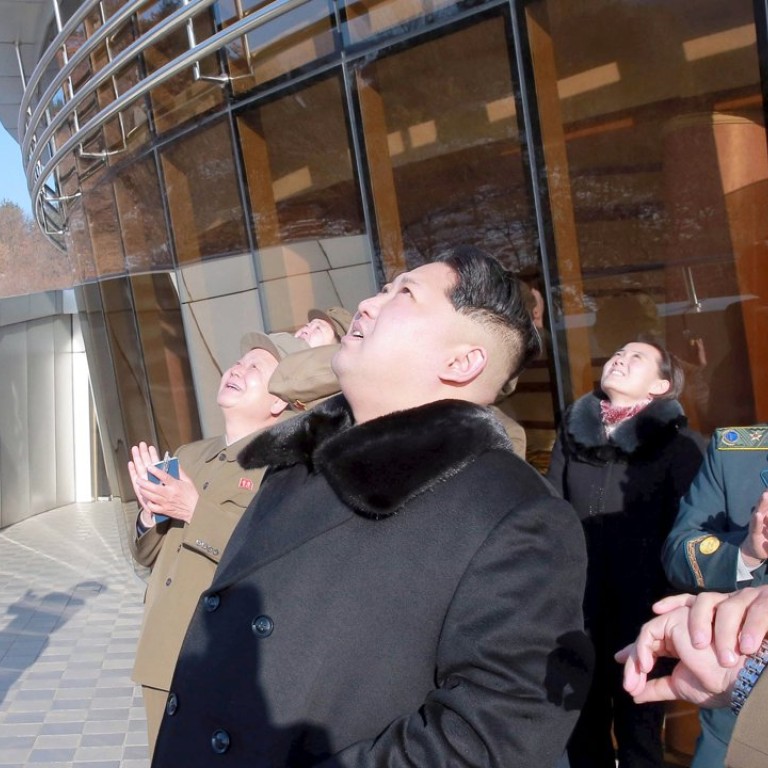
The reason North Korea’s Kim Jong-un may shrug off new sanctions? China
For all the efforts of the US and its Asian allies to impose fresh financial sanctions on North Korea, they are unlikely to make it much harder for Pyongyang to pay for its coveted long-range missiles and nuclear bombs.
The reason? China.
The US Senate approved new sanctions Wednesday against North Korea, and the House passed a similar measure last month. The moves come against the backdrop of the North’s firing of a long-range rocket on Sunday and conducting a nuclear test last month in violation of UN resolutions.


The park’s abandonment may turn off a source of funds for the North, but other financial taps remain open.
That’s because most banks that North Korea uses to finance trade, imports and weapons programmes work through China, said Richard Fisher, vice president of the International Assessment and Strategy Center.
“The financial wherewithal for North Korea to sustain itself runs through China,” Fisher said. “Without China participating, financial sanctions will not have a decisive effect.”
Unlike US sanctions on Iran, which were partially lifted recently in return for limits to that country’s nuclear programme, the proposed sanctions on North Korea do not target companies of third countries that do business in North Korea.
“That’s partly because it’s more difficult to discover those [companies],” said George Lopez, a professor at the University of Notre Dame’s Kroc Institute for International Peace Studies.

“For the benefit of targeting a few companies, most people in the State Department would say it’s not worth it,” Lopez said.
China is complicit in much of what North Korea does, Fisher said.
Chinese President Xi Jinping allowed a Chinese company in 2011 to provide North Korea with 16-wheel trucks, which are now used to transport inter-continental ballistic missiles that the US Defence Department says could carry a nuclear payload as far as Seattle.
“When North Korea and Iran seek to purchase high technology, materials or equipment for their nuclear and missile programs, the place that they like to shop is China,” Thomas Countryman, assistant secretary of State for international security and nonproliferation, told reporters in January.
China has a high-technology economy and produces a number of advanced goods that would benefit such programmes, Countryman said. China should “exercise the same degree of vigilance and control on strategic trade with Iran and North Korea as other countries do,” he said.
China also wants the North Korean leadership to survive, whatever it takes. Beijing uses North Korea to influence the democratic government of South Korea and to pressure Japan, Fisher said.
“It views the regime in Pyongyang as a brother Communist system that must survive at all costs,” Fisher said.
The unilateral sanctions imposed by the US and South Korea, as well as Japan, came with UN Security Council members still stalled on how far to go in punishing the North for its latest nuclear test and long-range rocket launch.
Defending what it called an “unavoidable” decision to close the jointly-run Kaesong park, Seoul said North Korea had been using the hundreds of millions of dollars in hard-currency that it earned from Kaesong to fund its weapons programmes.
But the move was slammed as “utterly incomprehensible” by owners of the 124 South Korean companies operating factories in the estate, who said their businesses were being destroyed by politics.
“It’s as if we’re just being ordered to jump off a cliff to our deaths,” said Jeong Gi-Seob, head of the Kaesong owners’ association.
Japan’s fresh unilateral sanctions, unveiled on Wednesday, include prohibiting North Korean ships from entering Japanese ports and a total entry ban on North Korean nationals into Japan.
Additional reporting by Agence France-Presse

